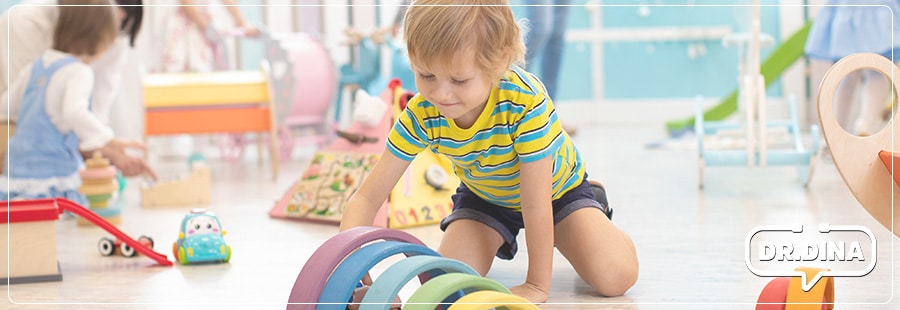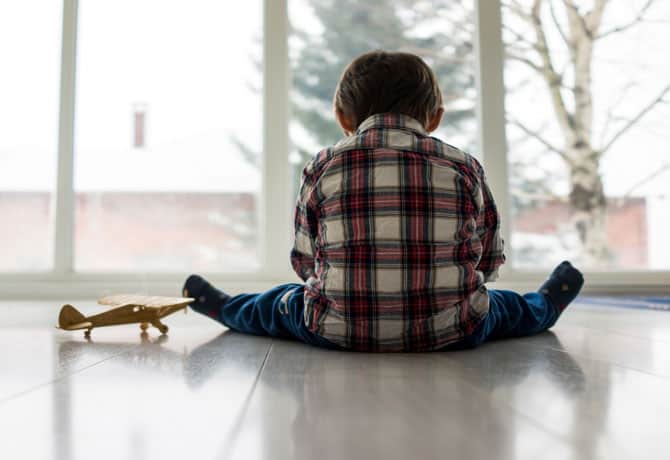Let’s Discuss The Transition to Daycare
Childcare programs can have a substantial positive impact on your child’s social development. However, these advantages can come at the price of emotional stress for both parent and child. Luckily, there are many ways to ease the transition into daycare and minimize stress for you and your child at childcare dropoff.
No two children are the same, so it is essential to consider your specific child’s needs and the workings of your chosen childcare facility. Before committing to a daycare, be sure to inquire about the transition options. You may be allowed to select the dropoff time and overall length of the transition to daycare.
I believe that infants require more extended transition periods. This is based on attachment figures and separation anxiety.

Daycare Transition Timing Can Vary
Transition to child care can be 1-2 weeks, and in my experience, most facilities offer a 1week transition. While one week may be suitable for children 18 months and up, I believe infants require more extended transition periods. This is based on attachment figures and separation. Your child has developed an intense emotional bond and attachment with you, causing emotional distress when you leave them, which most often manifests as stress for a toddler. There are different stages, and it is typically heightened once between 6-7 months then again at ten months.
Child Care and Separation Anxiety
While separation can be frustrating, often, it’s just part of the deal and not indicative of a developmental problem. It is a normal stage in your child’s development that will likely progress to healthier attachments over time. This separation in infants can occur whenever their primary caregivers leave, whether to go to work, go grocery shopping, or even leave the room. Because of this, it’s easy to imagine the stress a child will feel when they transition to attending childcare away from the attachment figure for the entire day. Children do not have a concept of time as an adult. A few hours at daycare feels like a full day of stress, fear, and all sorts of negative emotions.
Infants encounter anxiety when their parents or primary caregivers leave, whether to go to work, go grocery shopping, or at times as simple as leaving the room. This is especially true if parents have been with the child 24/7 during maternity leave.
Having a schedule will make the transition to daycare easier. However, a plan should be sorted out beforehand with a childcare facility.
For children 18 months and up, it should be about a weeklong and look similar to this one:
-
Day 1 9:30 am-10:30 am (parent stays with the kid)
-
Day 2 9:30-10:30 am
-
Day 3 9:30-12:30 am
-
Day 4 9:30-2:30 pm
-
Day 5 Full Day
In addition to a transition schedule, ask the daycare for information about the structure of your child’s day in the facility. You can then start to mimic the system at home to get your little one acclimated to any changes.
To assist them successfully through this time, I recommend having a special toy/animal.
Daycare Schedules Can Be A Challenge
It won’t be easy for all children to follow the schedule. I recommend having a special toy/animal to ease the process. You can even sleep with the animal for a few nights, so it has your scent. Bringing a family picture for your child to carry around with them can also dampen any negative emotions. Having a dropoff checklist ready to go ensures you don’t forget any of these items and trigger more stress from your kid. It is important to tell your child that you love them and will be back after a particular activity (lunchtime, nap time, or outdoor play). This way, your child can anticipate your return. Finally, I would also ask the childcare workers to have one teacher stay with your child until they are comfortable. This way, they will have the opportunity to bond with that teacher and build trust with them. Within one hour, most kids are feeling safe. Do your due diligence and ensure this is an option when your family drops off the baby or toddler.
It’s not a good idea to try and trick your baby during dropoff by leaving when they’re distracted or telling them you’ll be back in a few minutes. It is better to say a short goodbye, give your child the necessary information, and be on your way. Lying to them will only break the sense of trust and make dropoff even harder the next time. Honesty from parents can go a long way in fostering trust and comfort. Within several weeks, toddlers feel comfortable when parents leave.
For an infant, I would have a 2-week transition that looks similar to this:
-
Day 1 9:30-10:00 am (parent stays with a toddler on the first day)
-
Day 2 9:30-10:30am
-
Day 3 9:30-11:00am
-
Day 4 9:30-11:30am
-
Day 5 9:30-12:30pm
-
Day 6 9:30-1:30pm
-
Day 7 9:30-2:30pm
-
Day 8 9:30-3:30pm
-
Day 9 9:30-4:30pm
-
Day 10 Full Day
I recommend that you return to your child when they are not crying; this way, you can praise them for doing a great job while you were away. This will also leave them with positive emotions about their time spent at childcare. In addition, the child will notice that each time you’ve returned, they were happy and eventually keep up the proper behavior.
I have made this transition long because while most babies and infants can handle 4 hours away from their secure attachment (from family members) with a few sad moments, anything longer can be much harder on the baby and negatively affect the experience. If you have flexibility with your work, I recommend the above for a few weeks and then extend the time once your child is more comfortable with the facility, routine, and teachers.
Even if you make sure every aspect of your dropoff is perfect, likely, your child will still cry (you may too)! Especially if you have been with your baby at home during maternity leave, you may struggle with this transition as well. It’s a normal reaction that doesn’t need to be punished. Be prepared for tears, and be careful not to project too much frustration on your baby.
This Isn’t Easy, But Baby Drop Off Has Its Rewards!
Fun School Awaits!
While the process isn’t always easy, it’s worth it for a high-quality care facility. You may find yourself feeling guilty for inflicting stress on your child, but daycare is associated with positive outcomes for child development. You may likely find your child more socially inclined, exhibit better behavioral and emotional regulation, and display cognitive and language skills. Of course, any child will experience stress at some point, so try to relax and understand that you’re doing the best for your kid.
Speak to the childcare facility supervisor to ensure they can work with you and your baby to ensure a smooth transition.
Remember that your child will still love you at the end of the day, no matter what!
Read more on child-parent attachment and social development.
FAQs – Frequently Asked Questions
How can we involve my child’s teacher to make it easier?
Review your struggles with child care dropoff with the daycare workers, as they can lend a sympathetic and eager hand at dropoff. The more they know, the better they can help.
Why is the new environment so scary for my child?
A new environment is foreign for both of you and will require some getting used to. Don’t worry; the transition period is usually only the first few weeks in a new daycare center. Once daycare starts and parents leave, most children love the childcare center. By the time they eat lunch, and a child gets used to the surroundings and the daycare providers, you and your baby will feel more relaxed and comfortable in the new environment.
What are some helpful tips to get used to the new routine?
It is entirely normal for your baby to struggle for the first few weeks in the new setting. The transition time varies for each child, but most kids will quickly get used to a new daycare. Consider planning playdates with other children in their group. New friends who welcomed my kids when they started daycare were so helpful. Spending time with other kids from daycare outside the center helped my kids feel safe. Consider sending your baby with their favorite stuffed animal who can offer more support. If you have an older child in daycare, enlist them to help our little one feel safe and supported. Create a fun goodbye ritual that you can do each time at dropoff. Many parents find this routine can make the child feel safe. It can be challenging to drop off your first baby at daycare, but it is great for you and your little one. Consider starting daycare with half days, and ease into full days as your little one begins to warm up to the idea. As the day progresses, kids get used to the daily schedule and new routines. Some daycares enforce the providers to wear masks, so let your child know this in advance, so they are not scared. If your baby has challenges with communication skills, ensure the providers can foster these skills even when wearing a mask.
What can I expect from the first day at daycare?
On the first day of day care, many kids will have some trepidation as they say goodbye. Most babies are unaware of the new place and are happy in-home daycares and centers. Your toddler may cry or have trouble with you saying goodbye. This is normal. Spend some time before drop off reassuring your kid and telling them about a great time they will have at daycare, all the friends they will meet, and how friendly their teachers are. Talk about the new friends they will meet and the fun toys they can play with. Consider looking at a picture book that reviews what daycare is all about. Talk with them about what the classroom may look like and what they can expect. Talking about what life will be like there can help relieve stress. This can help make their first day less stressful. Once you say goodbye, try to leave the area so your kid doesn’t see you upset or anxious, as this can create more stress for your child. Spend minimal time dilly-dallying on the first day. Many daycares have cameras to see how your little one is doing in their classroom. Expect some separation anxiety on their first day, and then they will ease into this new life. Give your child some time to adjust. It is completely normal to have some challenges in the early days. Both you and they will thrive!
Will being in daycare hurt my baby’s immune system?
No! Quite the opposite! Being exposed to viruses and bacteria will help build your baby’s healthy and robust system.
#YouGotThis













